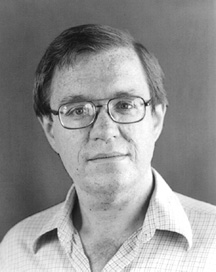You have reached the academic Website of Lloyd Etheredge. This site
(under construction) includes reference copies of earlier books; teaching notes;
and other materials used for teaching. For convenience, the papers of the International
Scientific Networks and Government Learning projects are on a parallel Website,
www.policyscience.net.
- The Case of the Unreturned Cafeteria
Trays (1976).
[In one file. Click here to download only Figure 1].
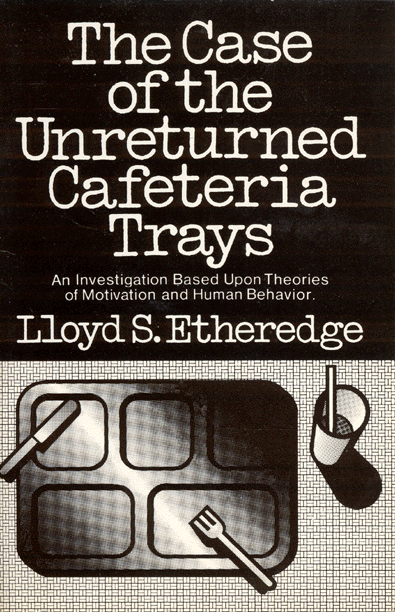
- Foreward and Acknowledgements
- Introduction
- I. The Cybernetic Model
- II. Social Learning
- III. Psychoanalytic Theories
- IV. Dramaturgical and Role Theory ("All the World's a Stage")
- V. Humanistic Psychology
- VI. Specialized Theories
- VII. Field Theory: Different Strokes for Different Folks?
- VIII. Thirty Theories in Search of Reality
- Additional Readings & Analysis Topics
A World of Men: The Private Sources of American Foreign Policy.
Cambridge, MA: MIT Press, 1978.
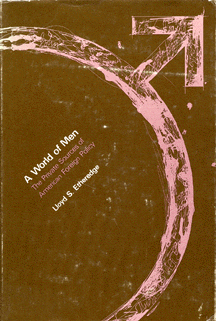
A comparative test, with multiple indicators, of five theories of
personality influence on foreign policy advocacy and
on perception. Quantitative data from a random sample of 126 State Dept. FSOs, with two
comparison groups of OMB (domestic) professionals and mid-career military officers at
the National Defense University. Also, a convergent study of American Presidents and
Secretaries of State, 1898-1968, assessing personality differences and directions of
policy disagreement. Variations in circumstances account for more of the difference in
tendencies to advocate or oppose (for example) the use of military force, but personality
predispositions can affect the decision in a range of situations such as US foreign
policy decision makers have faced. Personality effects on policy and on perception tend to work in the same direction, so that
highly ambitious, force-advocating males are more likely to perceive a world of dangerous,
expansionist competitors (and vice versa).
- Government Learning: An Overview. Cambridge, MA: MIT Center for International
Studies.
September, 1979. Published in Samuel L. Long (ed.), Handbook of
Political Behavior. (NY: Plenum Press, 1981), vol. 2, pp. 73-161.]
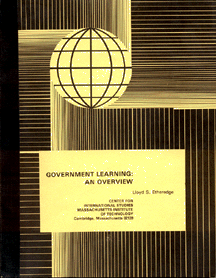
- Introduction (pp. 1-5).
- A Model for Theory Development: Medical Diagnosis Capability
- Overview and a Preliminary Caution
- Defining Learning (pp. 6-18).
- Types of Individual Learning
- Organizational Learning
- Learning Agendas
- Normative Issues (pp. 19-21).
- Trends (pp. 22-24).
- Motivation and Cognition - Individual Bases (pp. 25-64).
- Three Images of Individual Learning
- Fixed Behavior and Thought Patterns
- Fixed Emotional Drives
- Limited and Fixed Abilities and Intelligence
- Fixed Personality Structure and Dynamics
- General Observations
- Passive Reactive Models of Human Learning
- The Theory of Context Embeddedness
- "Will This Be on an Exam?"
- The Necessity for Leadership
- Imitation of High-Status People
- Avoiding Unpleasantness
- Cross Reward System Interference
- General Observations
- Active Learning-Developmental Theories
- The Prediction of Semiconfused Thinking
- The Prediction of Massively Underutilized Capacity
- The Need for Optimum Conflict
- The Need for Outside Perspectives
- Usable Memory as a Basis for Autonomy
- General Observations
- Selected Additional Issues
- Induced Blockages and Aversions
- Stress
- Aversive Motivations
- Resistances to Rethinking after Personal and Public Commitment
- General Emotional Issues
- Unconscious Motivation
- Action Mood Theories
- Cognitive Process Modeling
- Physiology of Knowledge and Learning
- Organizational Structure and Dynamics (pp. 65-77).
- "Smart" Organization theory
- Organizational Memory
- Qualitative Differences of Public Bureaucracies
- Intelligence Functions and Decision-Making Processes
- The Washington Political Environment (pp. 78-84).
- The Structure of Time in Washington
- Lobbying
- Accountability and Review Systems: Legitimacy Trade-Offs
- News Media Effects
- Uniqueness and Self-Transforming Capacity
- Societal, World, and Historical Contexts (pp. 85-88).
- Truth Theory
- Secularization and Orthodoxy Theories
- Government Learning: A Dependent Variable?
- Problem Types (pp. 89-94).
- No Problem
- Technology- Dependent Problems
- Resource-Dependent Problems
- Known-Answer Problems
- Unproductively Conceptualized Problems
- Problems Amenable to Full Scientific Method
- Strong-Norm-System Problems
- Pluralist, Low-Norm-Salience or Rapid-Change Problems
- Forecasting with Uncertain Precedents
- Problems Unanswerable or Unposable from Brain Constraints
- Secrecy Penetration Problems
- Different People and Different Cultures Problems
- Time-Constraint Problems
- Incoherent-Policy Problems
- Diagnostic Repertoires (pp. 95-96).
- Overview
- Illustrative Individual Diagnoses
- Concluding Observations (pp. 97-102).
- The Design of Institutional-Memory Capabilities
- Increasing Effective Transitions and Competence of Political Appointees
- Quality of Watchdog and Critic Systems
- Dependency Theory of Motivational Blockage
- Good Judgment
- Overload and How to Cope
- The Critique of Ideology and Overconfidence
- References (pp. 103-125).
- Can Governments Learn? American Foreign Policy and Central American Revolutions.
Elmsford, NY: Pergamon Press, 1985.
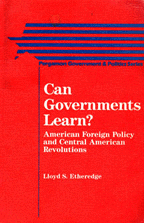
An evaluation of major theories of American foreign policy decision making, and
government learning/non-learning,
using three return engagements with similar decisions across 3 decades.
Develops a
new framework to account for decision processes and system-level barriers
to long-term
learning and follow-through. Also discusses counter-learning as the successful CIA overthrow
of the Arbenz regime in 1954, with about 110 people, was followed by two increases in orders
of magnitude - the Bay of Pigs (1200) and the Contras (15,000) - that failed, in part
because of learning by Central American revolutionaries.
- Politics in Wired Nations: Selected Writings of Ithiel de Sola Pool.
New Brunswick, NJ: Transaction Publications, 1998.
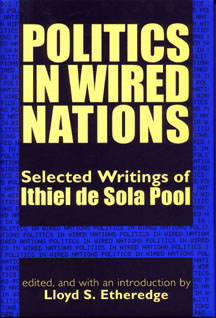
- Front material
- Introduction
- I. Political Communication
- Editor's Introduction
- 1. Introduction to Political Communication
- 2. Changing Images: The role of Communications in the Process of Modernization
- 3. Newsmen's Fantasies, Audiences, and Newswriting
- 4. Deterrence as an Influence Process
- 5. Contacts and Influence
- 6. American Politics: Congress and Its Constituents
- 7. Trends in Content Analysis Today: A Summary
- Part II: Societal Impact
- Editor's Introduction
- 8. Foresight and Hindsight: The Case of the Telephone
- 9. Communications Technology and Land Use
- 10. The Mass Media and Politics in the Modernization Process
- 11. Four Unnatural Institutions and the road Ahead
- Part III: Technology, Policy, and Freedom
- Editor's Introduction
- 12. Tracking the Flow of Information
- 13. The Public and the Polity
- 14. Citizen Feedback in Political Philosophy
- 15. Communication and Integrated Planning
- 16. Technology and Confusion: The Satellite Broadcast Controversy in the U.N.
- 17. From Gutenberg to Electronics: Implications for the First Amendment
- 18. Policies for Freedom
- Bibliography of the Works of Ithiel de Sola Pool
- Index
- Humane Politics and Methods of Inquiry: Selected Papers of Ithiel de Sola Pool.
New Brunswick, NJ: Transaction Publications, 2000.
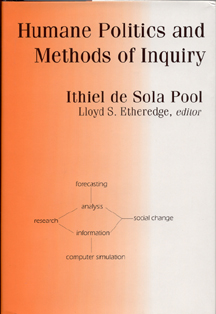
- Front material
- Introduction
- Part I: The Analysis of Communications
- Editor's Introduction
- 1. Symbols, Meanings, and Social Science
- 2. Content Analysis and the Intelligence Function
- 3. Scratches on Social Science: Images, Symbols, and Stereotypes
- Part II: Computer Simulation
- Editor's Introduction
- 4. The Simulmatics Project
- 5. A Postscript on the 1964 Election
- 6. The Kaiser, the Tsar, and the Computer: Information Processing in a Crisis
- Part III: Forecasting
- Editor's Introduction
- 7. The International System in the Next Half-Century
- 8. The Art of the Social Science Soothsayer
- 9. Foresight and Hindsight: The Case of the Telephone
- Part IV: Network Theory
- Part V: Social Science in Political Contexts
- Index
Other Writing
This page was last updated on November 5, 2001.
